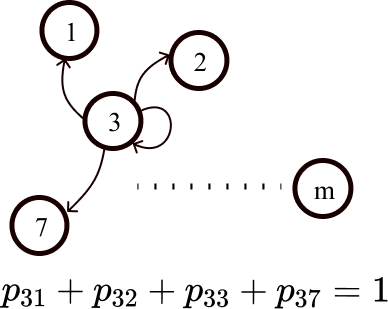15 May 2020 - Abhishek Nandekar
Markov Chains/Processes:
Markov Processes are a kind of stochastic processes which assume that the random variable $X_t$ captures all the information relevant for predicting the future. Hence, future depends upon the past and to some extent, can be predicted from the past.
Consider models in which past $\rightarrow$ future influence is summarised using states (which evolve based on PDF’s).

Discrete time $\implies$ Chains
Continuous time $\implies$ Processes
Checkout Counter Example:
Lets model a queue with certain assumptions:
- Probability of arrival of a random person at any time - $p$
- Probability of the departure of a person already in the queue - $q$
- Arrival and departure of people is mutually independent
- The maximum capacity of the queue is 10, and at each time instance, only one arrival and one departure are allowed.

Observations
- Transition probabilities are defined similarly for states $s \in [1:9]$, but differently for $s\in \{0, 10\}$
- ‘State’ $X_n/X_{t_n}$: number of customers at time $n$.
- From one time step to next, if we sum up all possible transition probabilities, they should sum up to 1.
Discrete Time Finite State Markov Chains
- $X_{t_n}$: state after $n$ transitions
- Initial state $X_{t_0}$ could be given at random
- States belong to a finite set
- Transition probabilities:

which implies, the transition probabilities are time homogenous/time invariant.
Markov (defining) property/assumption:
Given the current states, the past doesn’t matter.
Markov Chain of order:
\[\begin{aligned} P(X_{t_{n+1}} = x_{n+1}~\big| X_{t_{n}} = x_{n}, X_{t_{n-1}} = x_{n-1}, \dots, X_{t_{1}} = x_{1} )\\ = P(X_{t_{n+1}} = x_{n+1}~\big|X_{t_{n}} = x_{n})\end{aligned}\]where, $x_{n+1}, x_{n}, \dots, x_{1}$ are the states of the process.
Markov Chain of Order $k$
\[\begin{aligned} P(&X_{t_{n+1}} = x_{n+1}~\big| X_{t_{n}} = x_{n}, X_{t_{n-1}} = x_{n-1}, \dots, X_{t_{1}} = x_{1} )\\ &= P(X_{t_{n+1}} = x_{n+1}~\big|X_{t_{n}} = x_{n}, X_{t_{n-1}} = x_{n-1}, \dots,X_{t_{(n+1)-k}} = x_{(n+1)-k})\end{aligned}\]